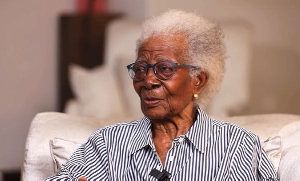What began as a simple phone call from an old friend evolved into a phenomenon that became a national asset.
In the early years of Ghana’s post-independence era, banks and financial institutions were not yet firmly established.
That changed with the emergence of a young, determined accountant named Aurore Salomey, who found herself at the center of one of Ghana’s most significant financial institutions.
From that single phone call grew a new era of transactions and investments, an initiative that transformed into a cornerstone of Ghana’s economy.
Aurore Salomey, one of the key figures behind the creation of the National Investment Bank (NIB), has shared insights into its formation, highlighting both the challenges and the triumphs.
According to her, it was the late Albert Adomako who turned this vision into reality.
She explained that Adomako handpicked a small group of trusted professionals to lay the foundation of the bank, with Salomey playing a leading role in accountancy. Together, they became the very first members of what would later be known as the National Investment Bank.
In an interview with Kafui Dey, Salomey recounted the difficulties faced during the bank’s early stages. She revealed that even experts from the World Bank Group, who were expected to guide them, ended up being taught and mentored by her team to ensure the work was done effectively.
“My good friend, Mr. Albert Adomako, of blessed memory, had been tasked to start the National Investment Bank, and he needed a core group to do this with. For accountancy, he chose me. They brought people from the World Bank to teach us, but when they came, we taught them. We ended up doing far more than they expected,” she said.
The establishment of NIB was not Salomey’s only achievement. She and her team also set up several companies under the bank’s guidance.
One notable example was the National Tobacco Rehandling Company, created at a time when pipe tobacco was a staple consumer product. NIB oversaw tobacco importation and later encouraged domestic cultivation.
How NIB recapitalisation can empower businesses and guarantee long-term sustainability
“We set up a number of companies that continued to operate even after I left. One we were especially proud of was the National Tobacco Rehandling Company. In those days, many people smoked pipes, and the company initially imported tobacco from abroad,” she recalled.
Though her contributions are not widely recognised, Salomey’s work laid the foundation for NIB’s enduring success. For her and her team, building the bank was more than an assignment, it was their contribution to Ghana’s economic architecture.
Today, the impact of their efforts remains evident. The National Investment Bank’s Capital Adequacy Ratio has improved dramatically, rising from -53.13% in December 2024 to +23% by May 2025.
This turnaround has safeguarded GH¢6.4 billion in depositor funds and preserved over 900 jobs, underscoring the lasting legacy of Salomey’s pioneering role.
Watch the interview below:
SP/MA
All you need to know about Ghana’s new vehicle number plates |BizTech:



